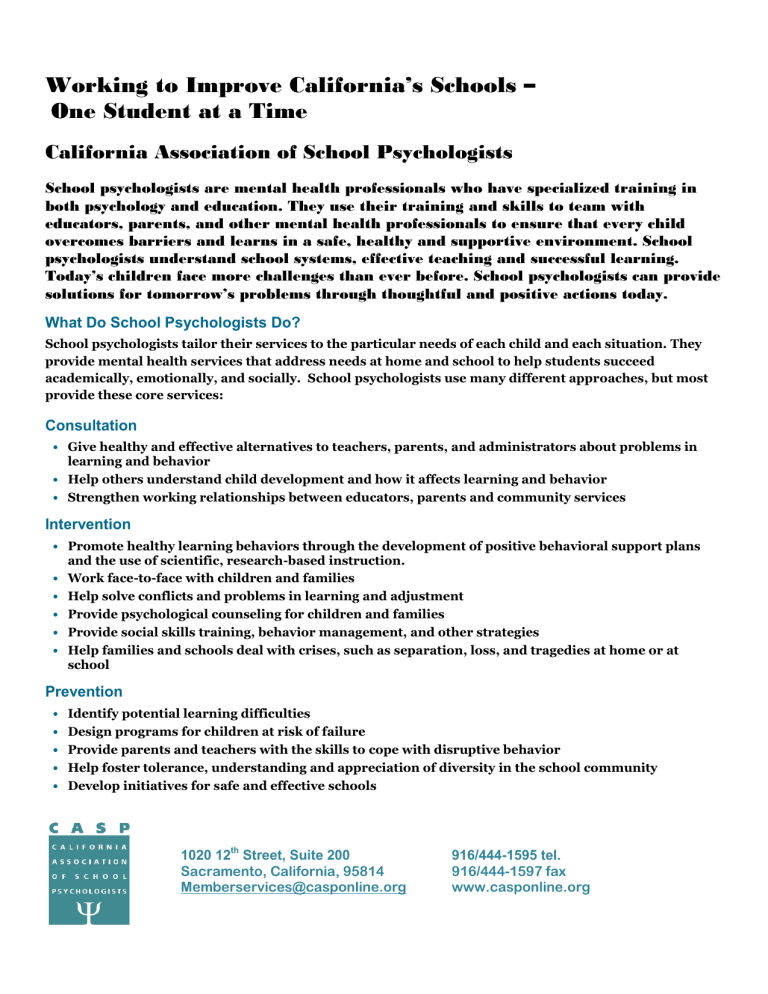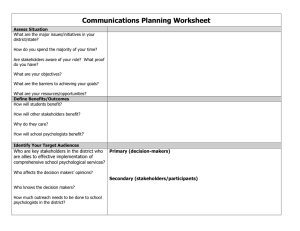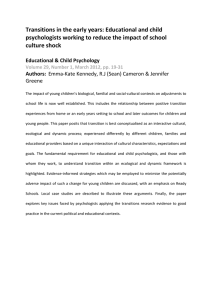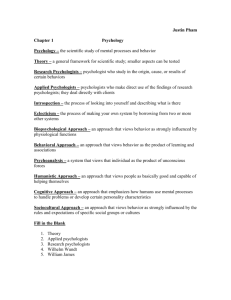
Working to Improve California’s Schools – One Student at a Time California Association of School Psychologists School psychologists are mental health professionals who have specialized training in both psychology and education. They use their training and skills to team with educators, parents, and other mental health professionals to ensure that every child overcomes barriers and learns in a safe, healthy and supportive environment. School psychologists understand school systems, effective teaching and successful learning. Today’s children face more challenges than ever before. School psychologists can provide solutions for tomorrow’s problems through thoughtful and positive actions today. What Do School Psychologists Do? School psychologists tailor their services to the particular needs of each child and each situation. They provide mental health services that address needs at home and school to help students succeed academically, emotionally, and socially. School psychologists use many different approaches, but most provide these core services: Consultation • Give healthy and effective alternatives to teachers, parents, and administrators about problems in learning and behavior • Help others understand child development and how it affects learning and behavior • Strengthen working relationships between educators, parents and community services Intervention • Promote healthy learning behaviors through the development of positive behavioral support plans and the use of scientific, research-based instruction. • Work face-to-face with children and families • Help solve conflicts and problems in learning and adjustment • Provide psychological counseling for children and families • Provide social skills training, behavior management, and other strategies • Help families and schools deal with crises, such as separation, loss, and tragedies at home or at school Prevention • • • • • Identify potential learning difficulties Design programs for children at risk of failure Provide parents and teachers with the skills to cope with disruptive behavior Help foster tolerance, understanding and appreciation of diversity in the school community Develop initiatives for safe and effective schools 1020 12th Street, Suite 200 Sacramento, California, 95814 Memberservices@casponline.org 916/444-1595 tel. 916/444-1597 fax www.casponline.org Education Develop programs on topics such as: • • • • • • Teaching and learning strategies Classroom management techniques Working with students who have disabilities or unusual talents Substance abuse Crisis management Anti-bullying programs Research and Planning • Evaluate the effectiveness of academic programs, behavior management systems, and other services • Generate new knowledge about learning and behavior • Contribute to planning and evaluating school-wide reform and restructuring Assessment Use a variety of techniques at an individual, group, and systems level to evaluate: • • • • • • Academic skills Learning aptitudes Personality and emotional development Social skills Learning environments and school climate Eligibility for special education Mental Health & General Health • Collaborate with school and community-based personnel to provide a comprehensive model of school-linked health services • Work with children and families to provide integrated community services focusing on psychosocial wellness and health-related issues • Develop partnerships with parents and teachers to create healthy school environments • Counseling and other mental health services Where Do School Psychologists Work? The majority of school psychologists are employed in public and private school systems. However, school psychologists practice in a variety of settings including: • • • • • Public and private schools School-based health centers Clinics and hospitals Private practice Universities, community and state agencies, and other institutions Ask a School Psychologist School psychologists can make a positive, lasting difference in children’s lives. Schools today serve increasingly diverse and dynamic student populations. Every child brings unique strengths and challenges to the learning process. School psychologists are a vital part of the effort to unlock each child’s potential for success. For more information on School Psychology, contact your school psychologist or the California Association of School Psychologists at 916.444.1595 or visit our website at www.casponline.org.






